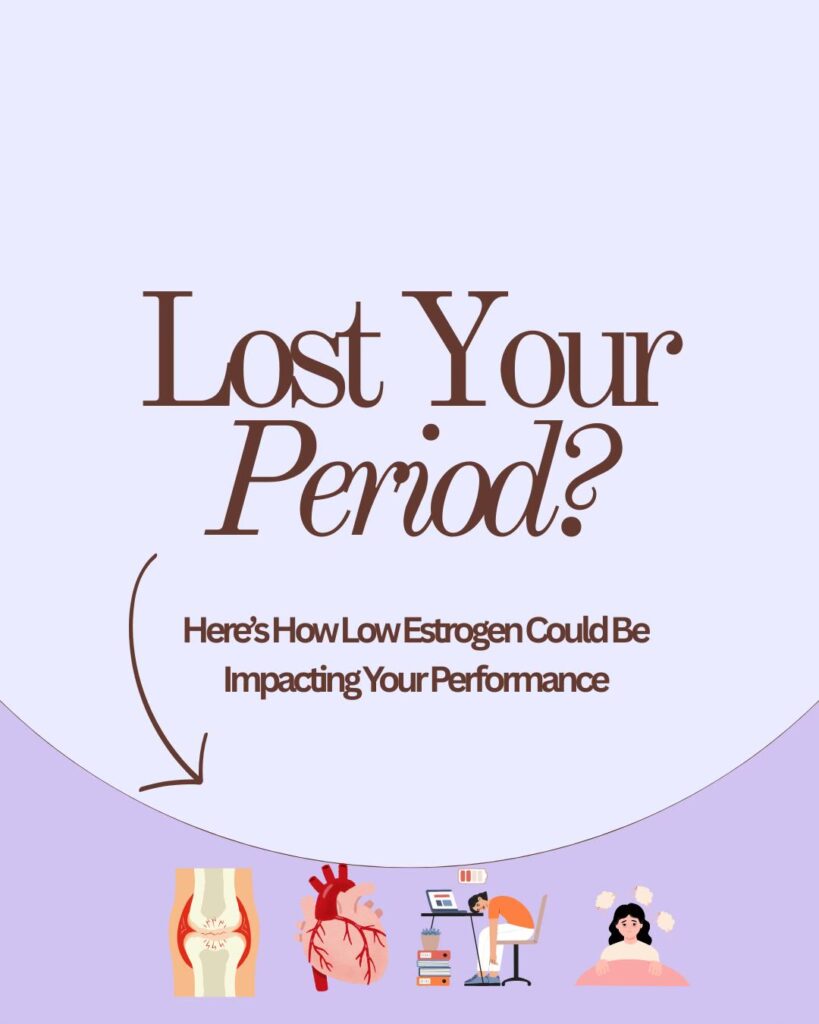Amy Stephens
MS, RDN, CSSD, CEDS
Licensed dietitian
specializing in sports nutrition
and eating disorders
MS, RDN, CSSD, CEDS
Licensed dietitian
specializing in sports nutrition
and eating disorders
If you’re a female athlete, getting your period is really important. There are many ways that you can use your cycle to your advantage in your sport and in life. When I started running in high school, there was this widespread belief—one that I hope is starting to fade—that losing your period was a sign of being in “peak fitness.” But that idea has no scientific basis and, in reality, it’s the exact opposite. Losing your period can have serious negative effects on your wellbeing, health, and athletic performance both in the short term and over the long run. I think a lot of women share the fear that they won’t perform well while on their period, especially with symptoms like cramps, fatigue, or emotional ups and downs. But in my experience, almost all of my personal bests throughout my athletic career have actually happened while I was on my period. I tend to feel stronger and notice a higher pain tolerance during that time.

The hormonal shifts that happen during your period—like the drop in estrogen and progesterone—can make you feel tougher, both physically and mentally. Some women might notice they can handle pain better or feel a surprising sense of strength. And honestly, when you’re not feeling your best, it can force you to lock in and push even harder. There’s a kind of mental edge that comes with knowing you’re working through it.
Having a stable and fairly regular period is one of the most visible and reliable signs of overall health. So if your period suddenly stops, it’s not something to brush off — it should serve as a red flag. It’s your body’s way of telling you that something may be off-balance. Here are some common reasons why you might lose your menstrual cycle:
Hypothalamic Amenorrhea (HA) – is a medical diagnosis made by your doctor that indicates your body isn’t producing enough reproductive hormones. This often happens due to factors like low energy availability, overtraining, weight loss, low body fat, or high levels of stress. These stressors cause the hypothalamus—a part of the brain that helps regulate hormones—to reduce its release of GnRH (gonadotropin-releasing hormone). This, in turn, lowers levels of LH and FSH, two key hormones that stimulate the ovaries. When these hormones drop, estrogen levels decrease, leading to irregular or missing periods.
When estrogen stays low for too long, it doesn’t just affect your period—it affects your entire body. For one, bone health takes a major hit. Estrogen helps keep your bones strong, so when it’s suppressed, you’re more likely to develop low bone density and face a higher risk of stress fractures and overuse injuries—the kind that can take you out of training or competition.
But it doesn’t stop there. Cardiovascular performance can drop, too. Estrogen supports healthy blood flow and heart function, so low levels can lead to slower recovery, reduced endurance, and feeling like your stamina just isn’t where it should be.
Low estrogen can also disrupt your sleep, making it harder to fall asleep or stay asleep through the night. Poor sleep can affect everything from recovery to focus, energy levels, and even immune function—which means your body has fewer chances to repair and recharge.
Mentally, you might notice mood swings, anxiety, or trouble focusing—all of which can seriously affect your motivation and consistency. And when it comes to building strength or bouncing back from tough workouts, low estrogen makes it harder for your muscles to repair and grow, which means you might not be seeing the progress you expect—even when you’re putting in the work.
A hormonal imbalance, especially low estrogen, can quietly chip away at your physical performance and mental edge. It’s not something to ignore—your body is trying to tell you it needs support.
During my time as a collegiate runner, I’ve learned to see my period as a tool, not a setback. I’ve had a consistent cycle for years, and it’s become something I rely on to guide my training. I’ve noticed that during certain phases—especially the follicular phase, right after my period—I feel stronger, more energized, and better able to push hard in workouts and races. My recovery is faster, and I feel more mentally dialed in. I use my cycle to help decide when to go all-in and when to ease up a bit, and I’ve found that I gain a lot of fitness during the blocks that fall within the “all-in” phase. Tuning into my cycle has helped me train smarter, perform better, and stay healthy season after season. Don’t be afraid of your period, embrace it! There is a reason we have it, don’t force it away!